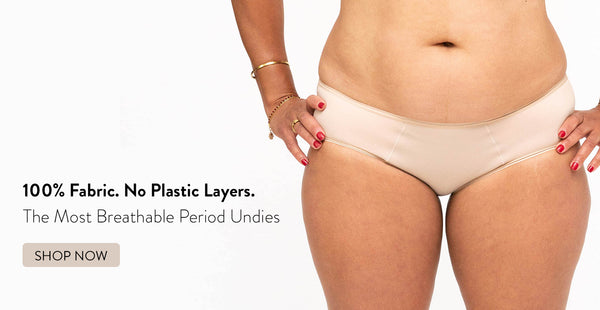Drink More Water On Your Period (And Always): Here's Why
Water is refreshing, cheap, and most importantly, essential to human life. We’re roughly 60% water and our cells need a fresh supply daily to regulate our temperature, lubricate our joints, and help us eliminate waste.
But how much do we really need, and why is it especially important when you’re on your period? Allow us to fill you in…
How much water should you drink?
There’s been some debate about this. The recommended amount varies from study to study and some medical professionals say we don’t need a hard and fast rule, while others recommend eight 8oz glasses of water a day. The Mayo Clinic calls that a “reasonable goal” but says the most important factor is not to go thirsty, so listen to your body.
There are also external factors: if you’re in a hot climate, breastfeeding, have been exercising, or are having your period (or some combination of the above), you’ll probably need to up your intake. Likewise if you’re not feeling well. Pace it out throughout the day, though, rather than gulping it down in one go.
Why is it important to drink water on your period?
If loss of blood during your period leaves you feeling exhausted and weak, you might be dehydrated. Even mild dehydration can make you tired and sluggish, physically and mentally.
Digestive problems are a common period side-effect, so if you’re constipated, it can relieve the situation and if you have diarrhea, it’ll help replenish your electrolytes (the salts and minerals your body needs to regulate your nerves).
When your levels of estrogen and progesterone are low, as they are at the start of a period, then your body is more likely to try to retain water, making you feel bloated and uncomfortable. As counter-intuitive as it might sound, drinking more water helps to flush out your system and keep you hydrated, and might also take the edge off cramps.
Menstrual migraines and headaches are also common at this time, and can while water can’t cure either condition, getting dehydrated certainly won’t help.
What is dehydration, exactly?
If you’re dehydrated, you’re losing more water than you’re taking in. That’s why it’s more likely when you’ve been sweating (whether through heat or exertion), have a stomach upset, or are on your period. It’s also associated with heatstroke, excessive drinking, and diabetes.
What are the signs that you’re not drinking enough water?
- Headaches
- Feeling dizzy or lightheaded
- Dark yellow urine that has a strong smell (it should be pale and transparent)
- Needing to go to the bathroom less than usual (every two-four hours is ideal)
- Dry eyes and lips
- Dry skin
- Feeling thirsty is the most obvious sign, but sometimes it shows up as feeling hungry, so have a drink first and then wait half an hour to see if the hunger was real.
Can I drink something else instead?
You can not only get your daily fix from other drinks, you can get some of the water you need from food – particularly fresh fruit and vegetables. Alcohol is dehydrating, so not the best choice, but drink water alongside it if you do indulge. Tea is diuretic (will make you go to the bathroom more, thus ridding your body of minerals more quickly), but the effects are mild. Even coffee is OK, as long as it doesn’t make your cramps and mood swings worse.
Really, though, water is the best. It’s low-effort, high impact, won’t rot your teeth or curdle your stomach, and you’re unlikely to be intolerant to it. All great reasons to go with the flow.

